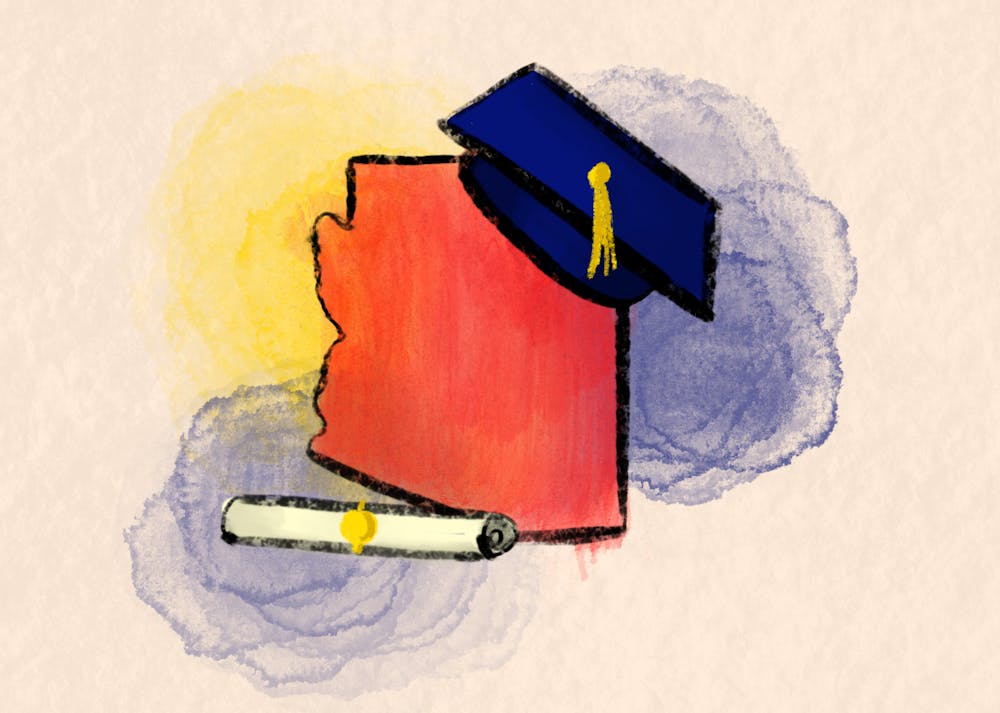The Arizona Board of Regents passed a tuition increase for in-state, out-of-state and international ASU students for the 2022-23 school year on Thursday.
ASU President Michael Crow initially announced the tuition and fee proposal on March 7. The approval marks the University's first significant changes to resident and non-resident tuition since the COVID-19 pandemic began.
In the meeting, Crow said the model of lower tuition and lower financial aid yielded lower four-year graduation rates and lower levels of diversity in past decades. He then said the tuition model of "modest tuition, high financial aid" is an operational and successful tuition model for the University.
"We've now produced five times the number of graduates, at two times the graduation rate with a diversity for the first time in the history of the state that matches the population of the state itself," Crow said in the meeting. "I call that a successful tuition model along with our pledge that no one will be left out for financial reasons."
Tuition will now increase for on-campus resident students by 2.5%, tuition for non-resident students will increase by 4% and tuition for international students will increase by 5%.
Base tuition for in-state undergraduate students and in-state graduate students will increase to $10,978 and $12,014, respectively.
Base tuition will go up to $29,952 for out-of-state undergraduate students. Out-of-state graduate student base tuition will increase to $32,656.
International students will see the largest of the tuition increases as their tuition is increasing by 5%. This will bring undergraduate international student tuition to $32,760. The tuition will increase to $35,280 for international graduate students.
Online undergraduate and graduate students will see a 2% increase per credit. This increase will make each credit hour $552 for undergraduate students and $554 per graduate credit hour.
College fees, which most undergraduate students pay in addition to base tuition depending on the student's specific college, were also increased between 2% and 2.5%.
ABOR also approved ASU to implement new program fees and increases to existing program fees for graduate students. These fees will be implemented as new fees for 23 graduate programs and as fee increases for eight graduate programs.
The international student fee will also be increased from $100 a semester to $200 a semester.
The price of student housing will increase by an average of 3% and the price of meal plans will increase by an average of 4.1%.
The graduate student support fee for on-campus students will increase by $5 per semester. ASU is also establishing a graduate student support fee for online students which will be $15 per credit. This fee consolidates existing class fees and the technology fee.
UA also saw increases in its in-state and out-of-state tuition. NAU saw an increase in base tuition and college fees, as well as an increase in international tuition.
The funding that state universities receive from the state has decreased in the past 20 years, and the amount of state funds per student has been cut nearly in half in the past 14 years, ABOR executive director John Arnold said in the meeting.
The state provides 10% of the total money coming into ASU, according to its 2022 budget. That is around $360 million of the University's total $3.4 billion.
READ MORE: Crow tells ABOR the University is functioning despite low state funds
ABOR chair Lyndel Manson said in the meeting the choice to support the hikes in fees and tuitions for all of Arizona's public universities was difficult. She said the universities will still provide significant financial aid.
"It is not our practice to limit access to our universities for financial reasons, that is the furthest from our minds," Manson said in the meeting. "While it is difficult at any point in time to increase tuition, and in particular now, we understand and are not deaf to the situation that all of us are in. It is the universities that find themselves in that same position."
There are also exceptions in tuition changes. The Polytechnic School, New College and colleges at Lake Havasu City campus will have varying tuition changes.
Reach the reporter at sbrenna5@asu.edu and @shanebrennan36 on Twitter.
Like The State Press on Facebook and follow @statepress on Twitter.

Shane Brennan is the former Editor-in-Chief at The State Press and an ASU alum. He was a sports and politics reporter, before becoming the editor of the politics desk. He has covered local and state politics for the Arizona Capitol Times and Cronkite News.




